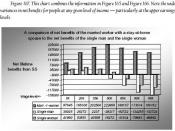The legally required employee benefits constitute nearly a quarter of the benefits package that employers provide.
These benefits include employer contributions to Social Security, unemployment
insurance, and workers' compensation insurance. Altogether such benefits
represent about twenty-one and half percent of payroll costs.
Social Security.
Social Security is the federally administered insurance system. Under current federal laws, both employer and employee must pay into the system, and a certain percentage of the employee's salary is paid up to a maximum limit. Social Security is mandatory
for employees and employers. The most noteworthy exceptions are state and
local government employees.
The Social Security Act was passed in 1935. It provides an insurance plan designed to indemnify covered individuals against loss of earnings resulting from various causes. This loss of earnings may result from retirement, unemployment, disability, or the case of dependents, the death of the person supporting them. Social Security does not pay off
except in the case where a loss of income through loss of employment actually
is incurred.
In order to be eligible for old age and survivors insurance
(OASI) as well as disability and unemployment insurance under the Social
Security Act, an individual must have been engaged in employment covered
by the Act. Most employment in private enterprise, most types of self-employment,
active military service after 1956 and employment in certain non-profit
organizations and governmental agencies are subject to coverage under the Act. Railroad workers and United States civil service employees who are
covered by their own systems and some occupational groups, under certain
conditions, are exempted form the Act. The Social Security Program
is supported by means of a tax levied against an employee's earnings which
must be matched buy the employer. Self-employed persons are required to
pay a tax on their earnings at a rate, which is...


